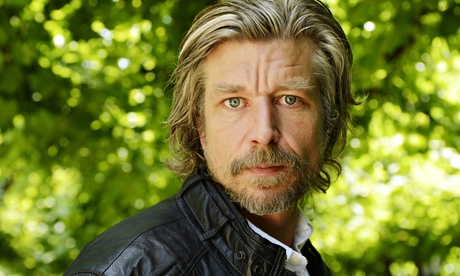
If you don’t want your books to be controversial, it’s probably better not to call them Mein Kampf. Karl Ove Knausgaard is Norwegian, not German, so what he actually called his autobiographical series was Min Kamp. It means, of course, “my struggle”, and that’s what it’s about: the struggle to grow up with an alcoholic father, the struggle to feel like a man in an equal-opportunities social democracy, the struggle at the hairdresser’s to remember the true colour of your hair. Whatever else it is or isn’t, it’s hardly a master plan for the human race.
Knausgaard’s not-quite-misery memoir hasn’t sold quite as well as Hitler’s, but it’s still doing pretty well. In Norway alone, the series of six books – published as “fiction” there, though everyone knows full well it’s autobiographical – has sold more than 450,000 copies. And he’s not just a homegrown hit. Outside of Norway he’s become a massive bestseller. Zadie Smith said she needed the next volume “like crack”.
Global success hasn’t, it seems, made the “struggle” easier. Half of Knausgaard’s family won’t speak to him. He has had so much hate mail he’s moved to Sweden. And then there’s the money. “We got money,” he said in a newspaper interview this week, “and it scared me … I said to [my wife], Linda, maybe we should give it away to Greenpeace or something, because it came from an unethical project … “She just looked at me,” he added, “and said no.”
As ethical dilemmas go, it certainly makes a change. Should whales benefit from the pain of your relatives? Should that money go towards the airfares of Greenpeace’s international programme director, who commutes from Luxembourg to Amsterdam? But the question of what writers owe their families is as old as the squiggles on papyrus in Tutankhamun’s tomb.
We know what happens when it all goes wrong. Hanif Kureishi’s sister made a big fuss about the way her brother portrayed his family in his work. Constance Briscoe’s mother sued her over the claims she made in her memoir, Ugly. James Frey was publicly shamed by Oprah Winfrey when his memoir turned out to be A Million Little Fibs. One person’s snapshot can be another’s distorting mirror.
But if you get it right, what happens then? Knausgaard’s friends and family aren’t upset because he got it wrong; ran upset because what he has written is embarrassing and exposing, and because they thought that what happened in their lives wasn’t about to be shared with millions of people around the world.
They thought there was a part of life that was private. They didn’t realise that the personal details of their lives were simply more fuel for a writer’s fire.
Graham Greene knew quite a lot about this. He said that every writer needed to have a “chip of ice in the heart”, knowing that anyone close to a writer was running a risk. But he said this at a time when writers were people who earned money by writing, and who published books. Everyone wasn’t churning out “content” about their lives, their friends, and their half-naked benders, in a digital universe that has no end.
It’s hard to know what Graham Greene would have made of people telling their Twitter “followers” that they’re looking forward to seeing friends none of them have heard of. He didn’t say all that much about narcissism, but he did say that “if you have a soul, you can’t be satisfied”, which does make you think he didn’t like people to sound smug. What mattered, for Greene, when it came to writing, wasn’t the subject but the art.
For art, you need a certain distance. You need, as Knausgaard says when describing a trip to the National Gallery, a “distance between reality and the portrayal of reality”. In other words, a chip of ice.
Knausgaard certainly has it. In a radio interview, he said he had sold his soul. The question is whether it was worth it. For him and his family, the answer may be no, but for millions of readers it will be yes.
Perhaps, in the end, there’s just one rule: if you’re going to put your personal life in the public arena, and risk upsetting people you’re meant to care about, you’d better make pretty damn sure you do it well.
Twitter: @queenchristina_

